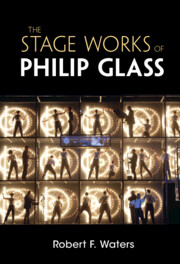Book contents
- The Stage Works of Philip Glass
- The Stage Works of Philip Glass
- Copyright page
- Dedication
- Contents
- Figures
- Tables
- Music Examples
- Selected Stage Works of Philip Glass
- Preface
- Acknowledgments
- Part I Background
- Part II Stage Works
- Chapter 5 Theater
- Chapter 6 Language and Philosophy
- Chapter 7 Themes, Genres, and Archetypes
- Chapter 8 Multimedia and Hybrid Genres
- Chapter 9 Dance
- Chapter 10 Music
- Chapter 11 Critical and Audience Reception
- Chapter 12 Conclusion
- Notes
- Select Bibliography
- Index
Chapter 11 - Critical and Audience Reception
from Part II - Stage Works
Published online by Cambridge University Press: 21 July 2022
- The Stage Works of Philip Glass
- The Stage Works of Philip Glass
- Copyright page
- Dedication
- Contents
- Figures
- Tables
- Music Examples
- Selected Stage Works of Philip Glass
- Preface
- Acknowledgments
- Part I Background
- Part II Stage Works
- Chapter 5 Theater
- Chapter 6 Language and Philosophy
- Chapter 7 Themes, Genres, and Archetypes
- Chapter 8 Multimedia and Hybrid Genres
- Chapter 9 Dance
- Chapter 10 Music
- Chapter 11 Critical and Audience Reception
- Chapter 12 Conclusion
- Notes
- Select Bibliography
- Index
Summary
Glass’s music has been both hailed and derided by audience members as well as critics. More traditional spectators asserted that his music was too repetitive, non-teleological, non-narrative, and seemingly simplistic. Nonetheless, critics at the 1984 revival of Einstein on the Beach largely hailed the work as a truly pivotal artwork of its time and asserted that it represented one of the “zeitgeists of the twentieth century.” This was also the case regarding Satyagraha (1979) following its American premiere at the Brooklyn Academy of Music. Yet many of the critics who championed these two stage works later felt that Glass had failed to live up to his promise as a progressive composer. By the late 1980s, many critics felt that the quality of his stage works had degraded, asserting that they had begun to sound formulaic and self-caricaturing. Despite this, audience members have remained largely euphoric, especially an evolving younger generation. And in Europe, Glass’s stage works have often received even greater public recognition than in the United States. Performances of Glass’s Einstein on the Beach at the Paris Opéra Comique in 1976 were sold out, with around two hundred people per night standing outside the theater in the hope of obtaining tickets; a similar phenomenon occurred in Italy, Germany, Belgium, Holland, and Yugoslavia.
- Type
- Chapter
- Information
- The Stage Works of Philip Glass , pp. 185 - 198Publisher: Cambridge University PressPrint publication year: 2022



